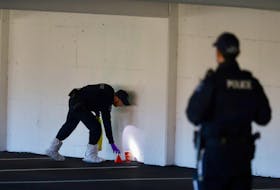The provincial justice minister announced a new memorandum of understanding Tuesday aimed at diverting more cases away from the province’s overburdened courts and into the restorative justice program.
“We introduced the adult restorative justice component a couple of years ago and we’ve already seen in the area of 1,500 cases diverted from the courts,” Mark Furey said Tuesday at a Halifax news conference.
“That’s significant when you think of the outcomes that we see from restorative justice that have been well established and documented through the research and it certainly lightens the load on our traditional court system.”
National statistics have shown restorative justice — an approach that focuses on rehabilitation of offenders through reconciliation with victims and the community at large — reduces repeat offences by 12 per cent.
The five-year memorandum of understanding aims to ensure that referrals to restorative justice are consistently considered and made more frequently. Key justice institutions have signed on, including Crown attorneys, courts, correctional services, victim services and the province’s eight community justice agencies.
But Furey couldn’t estimate how many more cases would be sent to the restorative justice program.
The announcement also doesn’t include more resources for the restorative justice system, but Furey said several probation officers will be reassigned to the program to deal with the expected up-tick in demand.
Demand will be monitored and more resources would be considered if needed, said Furey.
Last year, a group of Halifax restorative justice caseworkers went on strike over low wages and workload.
Yarmouth-based caseworker Emily Watkins attended Tuesday’s announcement. She spoke about how going through a restorative justice program as a troubled teenager changed her life and inspired her to become a caseworker.
Watkins said her office is contending with a backlog of referrals. When asked whether she’ll be able to deal with the added demand, she said, “There’s only one way to find out.”
“We’ve been preparing this for a while,” she said. “It’s a team effort and it doesn’t fall on one agency or two or three of them. It falls on all of us.”
The other changes include new regional lead teams, made up of senior staff within community restorative justice agencies and senior probation officers. The teams will assess adult referrals to determine the required supports and expertise needed for each specific case.
A governance and management committee will also be struck, made up of government, community and justice system leaders. The committee will provide oversight to ensure protocols are being applied and that restorative justice is being used in all appropriate cases.
Several agencies were involved in the new changes, including the Justice Department, Nova Scotia chiefs of police, RCMP, Public Prosecution Service, Advisory Council on the Status of Women, Nova Scotia Legal Aid, community justice societies and the Nova Scotia judiciary.
A provincial moratorium remains in place on the use of restorative justice in offences involving domestic or sexual violence.









